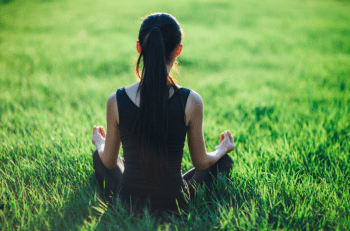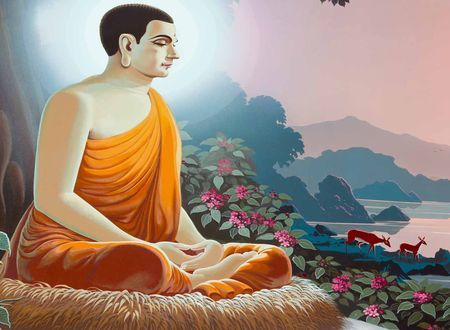In the preceding article on concentration, I briefly talked about the importance of one-pointed concentration. In this post I bring to you the practice to improve concentration. The term is ekagrata, single-mindedness. If I split this word for better understanding, it is comprised of Ek, one, and Agra, proceed. It means to proceed with oneness, with focus, with synchronicity, in a channelized fashion.
Imagine a tightrope-walker; he is doing the act with utmost one-pointed concentration. A moment of lapse in his concentration can cost him dear. Just before you enter into the meditative state, a certain uninterrupted stillness is required in your ekagrata for a reasonable period. If you can learn to concentrate, meditation will happen automatically.
Yogic texts are replete with exercises on the art of concentration and in many, if not most, the terms concentration and meditation have been interchanged freely. Many exercises that are supposed to enhance your meditative abilities are listed under concentration. My goal is to simplify it for you and to share with you those practices that helped me directly on my own path.
In simple words, concentration is the practice of fixating your mind on one single object. There are four ways to build your concentration:
a. Focus on an external object to improve concentration:
This requires that you set your focus on any external physical object. The eyes are left open when practicing concentration of this type.
b. Focus on an internal visualization to improve concentration:
Think of anything that pleases you. It should not be something that excites or arouses you physically or emotionally. Just something you find pleasing. Close your eyes and start visualizing the object. The image will keep disappearing from your vision, gently keep bringing it back. It requires great concentration to hold the mental image in front of you.
c. Focus on your breath to improve concentration:
Do not practice pranayama or alternate breathing as part of building one-pointed concentration. Simply watch your breath, pay attention to your inhalation, and exhalation. Concentrate on your breath. You can keep your eyes open or closed.
d. Focus on a mantra to improve concentration:
Mentally chant the mantra you have been initiated into. But the key is not chanting, the key is listening to each chant. That requires great concentration. Be steady, slow, and manage your pace. Just listen to the mantra, the sacred sound. Here is a detailed post on Shravana – the practice of listening to improve concentration.
The most important point to remember is that you must not engage in any intellectual examination while practicing concentration. This means: do not start examining, appreciating, understanding, or condemning your object of visualization. Just focus on the object and try your utmost to maintain your focus. Your mind is going to wander off every few seconds, bring it back. You may also want to read about the practice of Trataka to improve concentration.
Important notes on the practice of improving concentration
Do not hold long sessions of concentration initially. Instead, hold sharp, short, crisp, and lucid sessions, gradually increasing the duration. If you sit still for an hour and your mind is wandering off all the time versus you hold your posture and lucidity for ten minutes but practice rigorous concentration with utmost alertness, the latter is going to bring about results much quicker.
Carefully examine the above chart multiple times. Let us say you hold a session of concentration for fifteen minutes. During those fifteen minutes, you should be alert, in one posture – still like a rock or tree, focus keenly on the object of concentration and try your utmost to maintain lucidity.
Maintaining lucidity means that your mind may become dizzy, or the image of visualization may disappear, or the sound of the mantra may just get lost in distractions and deviations, but at that time you remind yourself of your resolve to concentrate and bring your mind back to the object of concentration; this is lucidity. If you follow the above, you are bound to become a great meditator.
In line with the chart above, when you are practicing concentration, be still, settle your mind, be aware, and maintain lucidity. You cannot guarantee complete stillness of the mind initially but if you fail to sit still, your practice of concentration is compromised. Start again. Hence, the advice on holding short but crisp sessions at first.
How to build the practice of improving concentration:
For the next forty days, resolve to practice concentration every day for thirty minutes divided into two crisp sessions of fifteen minutes or three of ten each.
The subject of concentration is profound and I can write a great deal on it. In essence though, there is no more to it than what I have just outlined.
In the next post in the series, I will introduce you to a wonderful and joyful practice to improve concentration.
Peace.
Swami
Editorial Note
Course
Art of Meditation
Free yourself from suffering and live life to the fullest. Learn the yogic technique of meditation in 4 days (and master it over a lifetime)
Does meditation increase concentration?
 What is fundamental to understanding how to improve concentration? Concentration is an act of simplification; the complicated mesh of intertwined thoughts is decimated through the act of concentration. Concentration, especially one-pointed concentration, comes with practice. The more you practice, the crisper your concentration.
What is fundamental to understanding how to improve concentration? Concentration is an act of simplification; the complicated mesh of intertwined thoughts is decimated through the act of concentration. Concentration, especially one-pointed concentration, comes with practice. The more you practice, the crisper your concentration.
If you can hold your concentration for as long as you want, you are on the verge of discovering meditation in its truest sense. Concentration can be contemplative, as in playing chess for instance, or passive, as in watching TV etc, or, it can be absorptive, as in reading a book for example. Read more here.
Can one learn how to do meditation to increase concentration?
 If you have been wondering how to improve focus and concentration in your life, look no further. Concentrative meditation is the art of staying on one thought. It is predominantly designed to help you settle your mind and attain stillness of the body. Concentrative meditation sharpens your concentration and builds your brain muscle.
If you have been wondering how to improve focus and concentration in your life, look no further. Concentrative meditation is the art of staying on one thought. It is predominantly designed to help you settle your mind and attain stillness of the body. Concentrative meditation sharpens your concentration and builds your brain muscle.
In a way, concentrative meditation is the preliminary practice of meditation. As you continue to practice, you will experience an inexplicable calmness, bliss will engulf you, a definitive quietude will dawn on you. Read more here.
A GOOD STORY
There were four members in a household. Everybody, Somebody, Anybody and Nobody. A bill was overdue. Everybody thought Somebody would do it. Anybody could have done it but Nobody did it.
Don't leave empty-handed, consider contributing.It's a good thing to do today.










Comments & Discussion
19 COMMENTS
Please login to read members' comments and participate in the discussion.